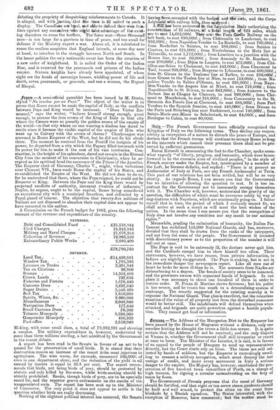iffraure.—A semi-official pamphlet has been issued by M. Dentu, styled
"Ne touches pas as Pape." The object of the writer is to prove that Rome cannot be made the capital of Italy, as the conflicts between Pope and King would he incessant. "Does Victor Em- manuel," says the writer, "believe himself strong enough, great i enough, to assume the iron crown of the King of Italy in that city where the OEMs wore so proudly the golden crown of the empire of the world—in that city where no one wearing a diadem has dared to reside since it became the visible capital of the empire of Him who went up to Calvary with the crown of thorns ? Charlemagne was crowned in Rome Emperor of the West, but he did not fix his abode there. The moment he received from the Pontiff the insignia of his power, he departed from a city which the Papacy filled too much with its power for him to make it the seat of his vast territories. Con- stantine, in the height of his splendour, dared not remain in the Eternal City from the moment of his conversion to Christianity, when he ac- cepted as his spiritual head the successor of the Prince of the Apostles. The Emperor elect of Germany, Charles V., might, when victorious over Clement VII., have made Rome the capital of his States, and re-established the Empire of the West. He did not dare to do so, for he understood that there, where the Pope reigned, he could not be Emperor or King. Between the Pope and the King there would be perpetual conflicts of authority, incessant rivalries of influence," Naples, he argues, ought to be the capital, Rome being considered an exceptional city with a municipal franchise, and defended by a Papal guard of honour. The objection that twenty-five millions of Italians are not disposed to abandon their capital does not appear to lave occurred to the author.
A Commission on the French budget for 1862, gives the following account of the revenue and expenditure of the country.
EXPENSES.
Debt and Consolidated Fund .
Civil Charges . . . Military and Naval Charges . Collection of Revenue . .
Extraordinary Public Works .
225,518,841 15,942,942 21,676,254 12,963,320 2,689,400 £78,790,760
REVENUE.
Land Tax. • .
£14,489,881 Window Tax. .
1,785,396 Licenses on Trades .
3,201,848 Tax on Citations .
36;800 Stamps . . .
14,358,480 Crown Lands
737,616 Fisheries and Forests
1,676,440 Customs Dues .
3,697,640 Sugar Duties . .
3,546,400 Salt Tax . .
1,610,080 Spirits, Wines, &c. .
8,060,000
Miscellaneous .
2,048,640 Navigation Dues .
177,640 Small Customs Dues
76,200 Tobacco Monopoly . •
8,936,000 Gunpowder Monopoly •
416,920 Post-office . .
• 2;519,040 Making, with some small dues, a total of 78,962,801 and showing a surplus. The military expenditure is, however, underrated by more than three millions sterling, a fact admitted by the Government in the recent debate.
A report has been read in the Senate in favour of an act to be passed for the preservation of small birds. It is stated that their destruction causes an increase of the insect tribe most injurious to agriculture. The wire worm, for example, consumed 360,0001. of corn in one department alone, and the reduction of the yield in oil caused by insects is equal to 33.8 per cent. The report recom- mends that birds, not being birds of prey, should be protected by statute and only killed by fire-arms, ai hile birds-nesting should be strictly prohibited. Rooks, though birds of prey, are to be specially eared for, and the reporter grows enthusiastic on the merits of the unappreciated owls. The report has been sent up to the Minister of Commerce. The only point it does not appear to settle is the question whether birds are really decreasing. Nothing of the slightest political interest has occurred, the Senate having been occupied with the budget and the owls, and the Corps Legishitif with railway billn,Ihus analyzed :
A Bill has been present.' b the Legislative Body authorizing the aconstruetiou of 25 railways, elf a total length of 823 miles, which are to eost 14,692,0001. Tkey‘arti: the Pans Girdle Railway on the left hank, to cost 880,0001. ; from Chateaulin to Landernau, to cost 932,0001, • from Napoleon-Vendee to La Rochelle, to cost 700,000/. ; from Rochefort to Saintes, to cost 380,000/. ; from Saintes to Coutras, to cost 824,0001. ; from Niederbronn to the Metz line at Thionville, to cost 1,712,0001.; from Louviers to a junction with the Rouen line, to cost 60,0001. ; from Annondy to St. Rambert, to cost 280,0001.; from Dijon to Langres, to cost 472,0001.; from Cha- tillon-sur-Seine to Chaumont, to cost 442,0001.; from Chaumont to Toul, to cost 908,000/. ; from Bergerac to Libourne, to coat 600,0001.; from St. Girons to the Toulouse line at Tarbes, to cost 200,0001. ; from Grasse to the Toulon line at Nice, to cost 152,0001.; from Na- poleon Vendee to Sables d'Olonne, to cost 268,0001.; from Napo- leon-Vendee to the Angers line at Niort, to cost 728,0001. ; from Napoleonville to St Brien; to cost 662,000/. ; from Auxerre to the Nevers line at Chagny by Clamecy, to cost 920,000/. ; from Cler- mont to Montbrison, to cost 158,0001. ' • from Commentry to the St. Germain des Fosses line at Clermont, to cost 688.0001. ; from Port Vendres to the Spanish frontier, to cost 440,000/. ; from Dieuze to the Paris and Strasburg line near Rechicourt, to cost 140,000/. • from Sainte-Marie-aux-Mines to .Schelestadt, to cost 64,0001.; and from Boulogne to Calais, to cost 60,0001.






























 Previous page
Previous page